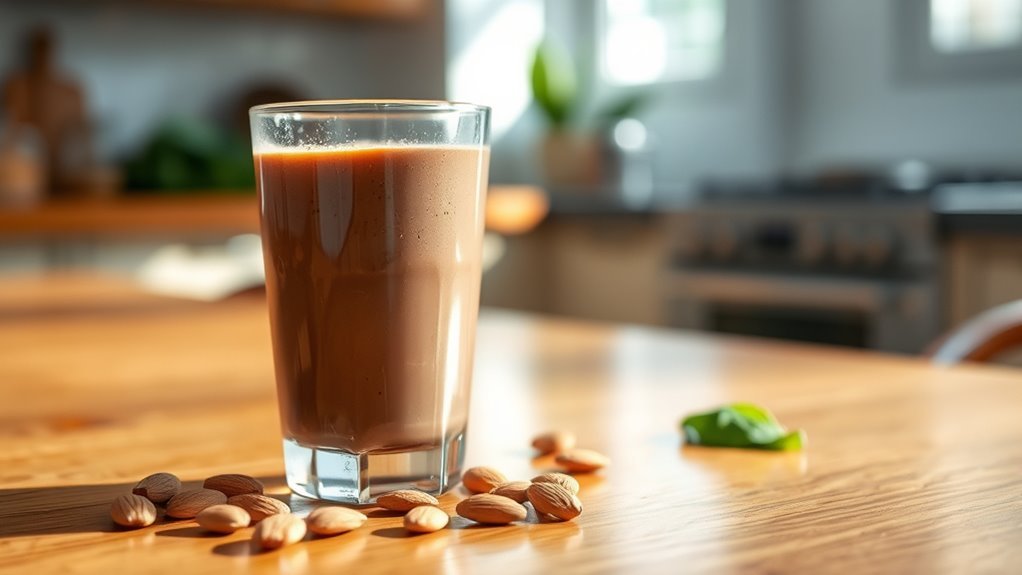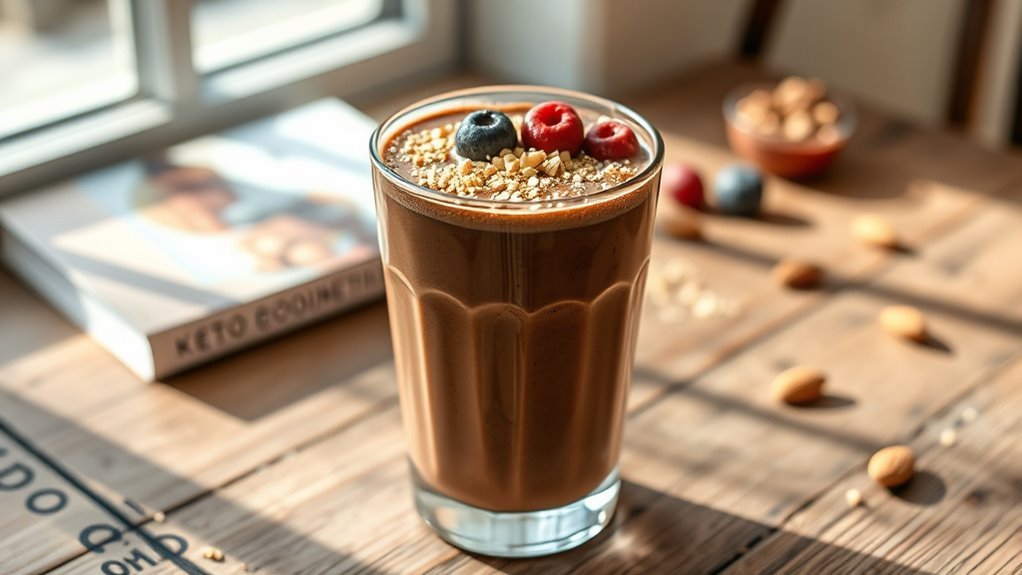Yes, protein shakes can fit into a ketogenic diet if you choose low-carb, high-fat options. Look for ingredients like whey protein isolate or plant-based proteins with minimal carbs. It’s crucial to check labels for hidden sugars that could disrupt ketosis. Homemade shakes allow you to control ingredients, while store-bought options require careful scrutiny. Monitoring your overall protein intake will help you stay within keto guidelines. There’s more to discover to maximize your protein shake benefits on keto.
Understanding the Keto Diet

What exactly is the keto diet? It’s a low-carbohydrate, high-fat eating plan that encourages your body to enter a state called ketosis. This means your body shifts from burning carbs for energy to burning fat, which can lead to weight loss. The keto principles focus on specific macronutrient ratios—typically around 70-75% fats, 20-25% protein, and only about 5-10% carbohydrates. By drastically reducing carb intake, you’ll force your body to utilize fat stores for energy. This approach can offer you more freedom in food choices, as you learn to enjoy healthy fats and proteins while limiting sugars and starches. Understanding these principles can empower you to make informed dietary decisions that align with your health goals. Additionally, tracking macronutrient intake is essential to maintain ketosis and achieve desired results.
The Role of Protein in a Keto Diet

While the keto diet emphasizes high fat intake, protein plays a crucial role in maintaining muscle mass and overall health. Adequate protein consumption is fundamental for protein synthesis, which helps repair and build muscle tissue, especially after workouts. When you’re on a keto diet, your body relies on fat for energy, but you shouldn’t neglect protein. Balancing your protein intake supports muscle recovery, preventing the loss of lean muscle mass that can occur during weight loss. Aim for moderate protein levels, typically around 20-25% of your daily caloric intake, to guarantee that your body gets the nutrients it needs without kicking you out of ketosis. This way, you can enjoy the benefits of both fat and protein in your diet. Additionally, monitoring protein intake is essential for maintaining balance on a keto diet and optimizing results.
Types of Protein Shakes

When considering protein shakes for a keto diet, you’ll find a couple of popular options: whey protein isolate and plant-based proteins. Whey protein isolate is a fast-digesting option that’s low in carbs, while plant-based alternatives can offer a variety of nutrients but may vary in carbohydrate content. Understanding these differences can help you make an informed choice that aligns with your keto goals. Additionally, selecting protein powders that are low in carbohydrates and high in healthy fats can further support your ketogenic objectives.
Whey Protein Isolate
If you’re looking for a high-quality protein source that aligns with a ketogenic diet, whey protein isolate might be the answer. It’s low in carbs and high in protein, making it a fantastic choice for your keto lifestyle. Whey protein offers several whey benefits, including quick absorption and improved whey digestion, which can support muscle recovery and growth.
Here’s a quick overview of whey protein isolate:
| Feature | Benefits | Keto Compatibility |
|---|---|---|
| Protein Content | High (90%+) | Perfect for keto |
| Carbohydrate Content | Low (1-2g per serving) | Fits within carb limits |
| Absorption Rate | Rapid | Great post-workout fuel |
Incorporating whey protein isolate into your routine can help you achieve your fitness goals while staying in ketosis. Additionally, understanding the nutritional content of your protein shakes is important for compatibility with your keto diet.
Plant-Based Protein Options
As you explore protein shake options suitable for a ketogenic diet, plant-based protein sources can provide excellent alternatives to traditional whey. These options can help you meet your protein needs while staying low in carbs. Here are some popular plant-based proteins to evaluate:
- Soy Protein: A complete protein that contains all essential amino acids.
- Pea Protein: Rich in iron and easy to digest, perfect for muscle recovery.
- Hemp Protein: Packed with omega-3 fatty acids and fiber, promoting overall health.
- Almond Protein: Low in carbs and high in healthy fats, ideal for keto.
You might also explore rice protein or protein blends for a thorough amino acid profile, ensuring you get the nutrition you want while enjoying the freedom of a plant-based diet.
Key Ingredients to Look For
When choosing a protein shake on a keto diet, it’s important to look for healthy fats and low-carb options. Healthy fats, like MCT oil or avocado, can help you meet your fat intake goals while keeping your energy levels stable. Additionally, a low carbohydrate content guarantees that you stay within your daily carb limit, making it easier to maintain ketosis.
Healthy Fats Content
While choosing a protein shake on a keto diet, it’s important to pay attention to the healthy fats content, as these fats can greatly impact your overall macronutrient balance. Incorporating healthy fats into your shake can enhance keto benefits like improved energy and satiety. Here are some key ingredients to look for:
- MCT Oil: Provides quick energy and supports ketone production.
- Coconut Oil: Rich in medium-chain triglycerides that promote fat burning.
- Avocado Oil: Packed with monounsaturated fats that aid in heart health.
- Nut Butters: Offer protein and healthy fats, adding flavor and creaminess.
Selecting protein shakes with these healthy fats can help you stay within your macros while enjoying the freedom and benefits of a ketogenic lifestyle. Additionally, incorporating options like Fairlife protein shakes can provide high protein content that supports muscle maintenance while adhering to low-carb dietary goals.
Low Carb Options
Choosing the right protein shake for a keto diet means not only focusing on healthy fats but also selecting low-carb options. When you’re on a keto journey, look for shakes that contain less than 5 grams of net carbs per serving. Ingredients like whey protein isolate or collagen peptides are excellent choices, as they provide high-quality protein with minimal carbs. Additionally, consider shakes that incorporate low-carb snacks like nuts or seeds, which can enhance both flavor and nutrition. For those needing keto meal replacements, opt for protein shakes fortified with MCT oil or fiber to keep you satiated. Always check the label for added sugars, as they can quickly derail your keto goals. Enjoy the freedom of choosing wisely! Moreover, being mindful of carbohydrate types is crucial to maintaining ketosis while enjoying your protein shakes.
Potential Carbs and Sugars in Protein Shakes
How do protein shakes fit into a ketogenic diet, especially when it comes to carbs and sugars? It’s essential to examine the carb content and sugar alternatives in your protein shakes. Here are some key points to take into account:
- Read labels: Check for total carbohydrates per serving, as some shakes can be surprisingly high.
- Sugar alternatives: Look for options sweetened with stevia or erythritol, which won’t spike your insulin levels.
- Protein sources: Whey protein can have varying carb amounts; isolate versions are generally lower.
- Add-ins: Be cautious with fruits or flavored powders that may introduce extra carbs. Additionally, consider using natural peanut butter as a tasty, low-carb ingredient to boost flavor and healthy fats in your shake.
Homemade vs. Store-Bought Protein Shakes
When considering protein shakes for a ketogenic diet, understanding the differences between homemade and store-bought options is vital. Homemade recipes often let you control ingredients, ensuring low carb and sugar content tailored to your needs. You can experiment with various proteins, like whey or plant-based options, and add healthy fats, such as avocado or coconut oil, enhancing nutrition.
On the other hand, store-bought brands offer convenience, but they can be misleading. Many contain hidden sugars and carbs, making it challenging to stick to keto guidelines. It’s important to scrutinize labels and choose wisely. Ultimately, both options have their merits, and your choice should align with your lifestyle, budget, and dietary goals.
Best Protein Shake Options for Keto
For those on a ketogenic diet, selecting the right protein shake can greatly impact your macronutrient balance. You’ll want to choose options that are low in carbs and high in healthy fats. Here are some of the best protein shake options you can consider:
- Isolate Whey Protein – Often low in carbs and comes in various protein shake flavors.
- Collagen Protein – Excellent for skin and joint health, with minimal carbs.
- Egg White Protein – A great alternative for those avoiding dairy, typically low in carbs.
- Plant-Based Protein – Look for blends that have a balanced amino acid profile and low carb content.
When exploring protein shake brands, always check labels to verify they fit your keto lifestyle! Additionally, incorporating protein shakes can help meet your nutrient-dense vegetables needs while adhering to the diet.
Timing and Usage of Protein Shakes on Keto
While you might think that any time is a good time for a protein shake, timing can actually play a significant role in maximizing its benefits on a ketogenic diet. For ideal consumption, consider having your shake post-workout, as this can aid in muscle recovery and growth while keeping you in ketosis. Morning shakes can also kickstart your metabolism, making them a great option if you’re feeling sluggish. However, be mindful of your overall daily protein intake to avoid exceeding your macros. Additionally, consider timing your shakes between meals to curb hunger without impacting your carb limits. By keeping these timing considerations in mind, you can effectively incorporate protein shakes into your keto lifestyle while enjoying the freedom it offers.
Tips for Choosing the Right Protein Shake
Choosing the right protein shake can greatly enhance your keto experience, especially after considering how timing can optimize its benefits. To make the best choice, keep these tips in mind:
Selecting the ideal protein shake can significantly boost your keto journey, especially when timing is factored in for optimal results.
- Check Nutritional Labels: Look for low-carb and high-fat options to align with your keto goals.
- Flavor Preferences: Choose a flavor you enjoy; this makes it easier to stick with your routine.
- Ingredient Sourcing: Opt for shakes with natural, high-quality ingredients to guarantee you’re fueling your body right.
- Avoid Additives: Steer clear of artificial sweeteners or fillers that can disrupt ketosis. Additionally, ensure that your shake supports macronutrient ratios to maintain effective ketosis.
Frequently Asked Questions
Can I Use Protein Shakes for Meal Replacements on Keto?
Yes, you can use protein shakes for meal replacements on keto, but be mindful of the shake ingredients. Look for low-carb options that fit your meal timing. A shake with healthy fats, like avocado or coconut oil, can keep you satiated longer. Make sure it’s high in protein while avoiding added sugars. Balancing your macros is key, so consider shakes as part of a well-rounded diet rather than a complete replacement for every meal.
Are There Vegan Protein Shakes Suitable for Keto?
Yes, there are vegan protein shakes suitable for keto. Look for plant-based options that use keto-friendly ingredients like pea protein, hemp protein, or brown rice protein. These shakes often contain minimal carbohydrates and healthy fats, making them a great fit for your dietary goals. Just check the labels to verify they don’t have added sugars or high-carb fillers. This way, you can enjoy protein shakes while staying true to your keto lifestyle.
How Many Protein Shakes Can I Consume Daily on Keto?
You can enjoy one to two protein shakes daily on keto, but don’t go overboard! After all, you wouldn’t want to turn into a walking blender, would you? Stick to low-carb protein shake types, like whey isolate or collagen, to maintain your daily intake without sabotaging your macros. Balance is key; think of those shakes as a supplement, not your entire meal plan. Freedom comes from smart choices, not liquid meals!
Do Protein Shakes Affect Ketosis Levels?
Protein shakes can affect ketosis levels, depending on the protein types and ingredients you choose. If the shake contains high carbs or sugars, it might disrupt your ketosis impact. However, low-carb protein sources like whey or collagen can fit into your keto diet. It’s crucial to monitor your overall carb intake and guarantee your shakes don’t push you over your limit, allowing you the freedom to enjoy them without compromising your goals.
Can Protein Shakes Help With Muscle Gain on Keto?
Yes, protein shakes can help with muscle gain on keto. They’re an excellent source of protein for muscle recovery, especially when paired with low-carb protein sources like whey or collagen. These shakes can provide the necessary amino acids to support muscle repair after workouts. Just be mindful of added sugars that could interfere with ketosis. Incorporating them strategically into your diet can aid muscle growth while still enjoying the freedom of a keto lifestyle.
Frequently Asked Questions about Protein Shakes and Keto
1. Are protein shakes suitable for a keto diet?
Yes, protein shakes can be suitable for a keto diet, but it depends on the ingredients and nutritional content of the shake. Look for shakes that are low in carbohydrates and sugars, ideally containing high-quality protein sources like whey or plant-based proteins. Always check the label to ensure the carbohydrate content aligns with your daily macros on a ketogenic diet.
2. What should I look for in a keto-friendly protein shake?
When choosing a keto-friendly protein shake, look for the following:
- Low carbohydrate content (typically less than 5g per serving)
- No added sugars or sugar alcohols that may spike insulin levels
- High-quality protein sources (whey isolate, casein, or plant-based proteins)
- Healthy fats (like MCT oil or coconut oil) to help meet your fat intake goals
3. Can I make my own protein shake for keto?
Absolutely! Making your own protein shake allows you to control the ingredients and ensure it fits your keto requirements. You can combine unsweetened almond milk or coconut milk with a low-carb protein powder, add healthy fats like avocado or MCT oil, and include keto-friendly flavorings like cocoa powder or vanilla extract. Just be sure to keep track of the macros to stay within your daily carb limit.
4. Are there any protein shakes that should be avoided on keto?
Yes, on a keto diet, you should avoid protein shakes that are high in carbohydrates, particularly those with added sugars, syrups, or sweeteners that can increase your carb intake significantly. Many meal replacement shakes and flavored protein powders can contain hidden sugars, so it’s crucial to read labels carefully. Shakes with high fructose corn syrup or maltodextrin should also be avoided as they can hinder your ketogenic goals.
5. How can protein shakes fit into my daily keto meal plan?
Protein shakes can be a convenient way to meet your macronutrient goals on a keto diet, especially if you’re busy or on-the-go. You can use them as a meal replacement, post-workout recovery drink, or a snack. Just ensure that the shake complements your overall daily intake of fats, proteins, and carbs. For example, if you have a shake, adjust your meal portions accordingly to maintain your keto balance.
References
- https://www.ncbi.nlm.nih.gov/pmc/articles/PMC7070934/
- https://www.healthline.com/nutrition/keto-diet-food-list
- https://www.webmd.com/diet/what-is-the-keto-diet
- https://www.mayoclinic.org/healthy-lifestyle/nutrition-and-healthy-eating/expert-answers/what-is-the-ketogenic-diet/faq-20058232
- https://www.verywellfit.com/what-is-the-ketogenic-diet-5113285
- https://www.ketogenic.com/what-is-keto/
- https://www.cdc.gov/healthyweight/assessing/bmi/adult_bmi/index.html
- https://www.medicalnewstoday.com/articles/323653


